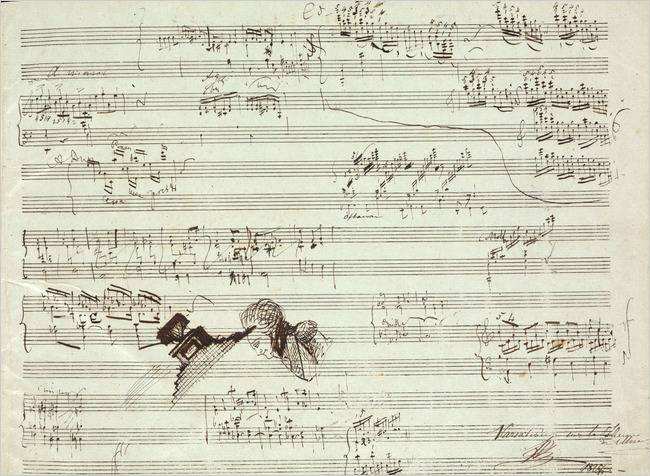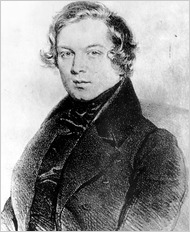In this fascinating article from the NY Times recently, we learn how two of the greatest classical composers from the 19th century developed separately from each other, even though they were born in the same year:
Chopin and Schumann, whose bicentenaries the classical music world celebrates this year, have long been linked as pioneers of Romanticism, in part because of the shared year of their births. Yet they were quite different creative artists who had little personal contact and moved mostly in separate circles.Frederic Chopin, the son of a French immigrant to Poland and a Polish mother, studied music in Warsaw until, at 20, he set out to further his career elsewhere. He never returned to his native land. He spent most of the rest of his life in Paris, where he was one of many Polish expatriates. Robert Schumann, born in Zwickau, Germany, lived and worked mostly in German cities, especially Leipzig.
Chopin was a natural musician with such precocious talents as a pianist and improviser that he considered himself essentially self-taught. Schumann was a bookish young man raised in a literary household where music was a rewarding amateur endeavor. Initially drawn to literature as much as music, he likened musical composition to a poetic activity.
The story begins when both are just out of their teens:
To understand the contrasting backgrounds from which Chopin and Schumann emerged, consider what each was up to around the time of his 20th birthday. On graduating from music school, Chopin secured two important concerts in Vienna. At one he played his Variations for Piano and Orchestra on "La ci darem" from Mozart's "Don Giovanni." Writing home about his success, he said that "everyone clapped so loudly after each variation that I had difficulty hearing the orchestral tutti." From all reports he was an astonishing pianist. Yet sickly, retiring and prone to mood swings, Chopin was a reluctant concert artist who considered publicity an invasion of his privacy.Schumann at 20, though aching to be a musician, was studying law in Leipzig and miserable about it. His father, a writer who made a good living translating Byron and Walter Scott into German, had died in 1826. His will stipulated that Robert would have to complete three years of university training to receive his inheritance. Though indifferent about his law lectures, Schumann was passionate about the piano lessons he was taking with the renowned teacher Friedrich Wieck. Still, he was plagued with insecurity. In a diary entry he assessed his talents in poetry and in music as "at the same level."
Schumann, who would write reviews of his fellow composers' music in a published journal, said of Chopin in 1831, "Hats off, gentleman, a genius!"
They finally met in 1836:
Schumann followed Chopin's progress closely, mostly from afar. But on Oct. 9, 1836, they spent an "unforgettable day" together, in Schumann's words, when Chopin passed through Leipzig. Schumann was enthralled with Chopin's new Ballade in G minor, finding it an original and ingenious work. Chopin may have tried out an early version of the Ballade in F major for Schumann, to whom he eventually dedicated it. Was Chopin already aware of Schumann's penchant for identifying multiple personalities within himself, now pensive, now wild and impetuous? The F major Ballade is Chopin's most bipolar piece: a tender pastoral theme keeps being interrupted by furious outbursts.
But just as great artists and composers of today are influenced by the masters, so were Chopin and Schumann by Beethoven:
By the time Chopin and Schumann came of age as young musicians, Beethoven, who died in 1827, loomed as an intimidating giant. Every subsequent composer had to come to terms with Beethoven, who took the symphony, the sonata and the string quartet into new realms. The architectural grandeur and sheer substance of Beethoven's works held most of the new generation in thrall. Schumann embraced the challenge of Beethoven. Chopin could not be bothered.
Who did Chopin turn to for inspiration and guidance for his artistry?
Bach and Mozart were Chopin's gods, though he also loved the bel canto opera composers of his day, especially Bellini. The symphonic imperative, the whole Beethoven thing, meant nothing to him. Composing nocturnes, mazurkas, waltzes, ballades and other novel works for the piano was what he did. He was not even that interested in the music of his contemporaries, though he was friendly with Berlioz, Liszt, Mendelssohn and others.
George Sand, the cigar-chomping woman he was with for nine years, had some special insight into his creativity:
The most intriguing description of Chopin's creative process came from the French novelist George Sand, who had a nine-year love affair with him. Sand was six years Chopin's senior, and there was an oddly maternal element to her love. "My third child," she sometimes called him. But no one knew Chopin better.When he composed, according to Sand, ideas poured from him, almost as if he were improvising. Then came an agonizing process of working out the ideas amid torment, anger and weeping. There would be countless changes until, by the end, Chopin arrived back at something close to the initial inspiration.
The article goes on to describe in detail the music of each master, and then finishes with how they both ended their lives:
It is amazing that Chopin's enormous reputation as a pianist was based only on some 30 formal concerts that he gave during his lifetime. He was just too physically weak for concert life. From all reports his sound at the piano, with minute gradations of softness, was exquisite but small. He was most comfortable playing at salons and private homes.He made his living from his published works and from teaching piano, for which he commanded exorbitant fees. He pushed the boundaries of what was possible technically by composing 24 formidable etudes, published in two books, which he began when he was 20. Though the etudes explore specific areas of technique, they are musically riveting works. And if you can play the Chopin etudes, you can play anything written for the piano.
By 1847 Chopin's relationship with Sand was over. He lived another two years, dying from tuberculosis in Paris at 39.
And Schumann?
Schumann's desire to combine the arts of poetry and music achieved a blissful synthesis when he turned to song in 1840, a burst of creativity that surrounded his marriage to Clara...who gave birth to eight children (and) also became one of the most celebrated pianists in Europe.The marriage was tragically affected by Schumann's lifelong bouts of depression and mental instability. Whether his troubles, which in later years included delusions, hearing voices and fits of sobbing, were a psychotic disorder or resulted from syphilis has long been debated. In 1854, in a state of panic and worried that he might hurt Clara, Schumann left their home in Dusseldorf early one morning and leapt off a bridge into the Rhine. Rescued by fisherman, he was sent to an institution outside Bonn, where he died two years later. Clara was not allowed to see him until two days before his death.
Their lives are almost as interesting as their music is sublime and singular. Read the entire article and go see their music this year as we celebrate the 200th anniversary of their birthdays.

"It was fascinating to see the mix of fastidious and freewheeling penmanship in the variations. On the last page of the bound volume, among random musical sketches, there is a doodle, a drawing of a bewigged man in a coat with epaulets next to a monument with a missing statue. Surely this is Chopin's impish caricature of Mozart."
Frederic Chopin
Robert Schumann
Permalink to post: http://www.cslproductions.org/music/talk/archives/000890.shtml
Receive an email whenever this MUSIC blog is updated: Subscribe Here!
Tags: 200th anniversary, Chopin, etude, mazurka, Schumann
home | music | democracy | earth | money | projects | about | contact
![]() Site design by
Matthew Fries | ©
2003-23 Consilience Productions. All Rights Reserved.
Site design by
Matthew Fries | ©
2003-23 Consilience Productions. All Rights Reserved.
Consilience Productions, Inc. is a 501(c)(3) non-profit organization.
All contributions are fully tax deductible.






